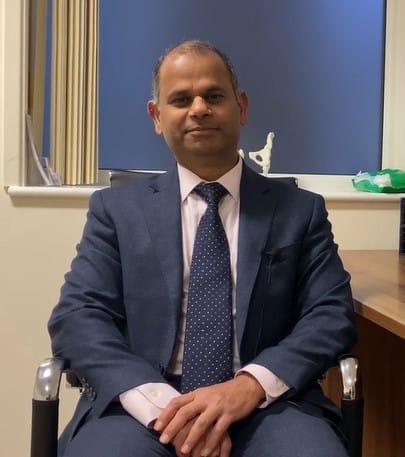If you can hear persistent high-pitched ringing, whirring, whining or buzzing noises inside your head and no one else can – you may have tinnitus.
‘It’s an incredibly common condition estimated to affect around 10-15 per cent of the population and around half of those affected (7-8 per cent of the population) will consult their GP about it,’ says Mr Andrew McCombe, an ear, nose and throat specialist, formerly at Frimley Park Hospital, Surrey, but now based at the Medi Clinic City Hospital in Dubai and past honorary secretary of ENT UK.
‘Tinnitus bothers some people much more than others; some are just able to zone out from the noise and don’t notice it too much, but at the other end of the spectrum others can find the noise intolerable.’
What causes tinnitus?
Damage to the sensitive nerves inside the inner ear is the major cause of tinnitus.
‘The nerve fibres start misfiring as a result,’ explains Mr McCombe. ‘The damage can be due to many causes but either age-related deterioration or exposure to loud noise – such as working on a construction site or in a factory or even loud music are the most common.’
‘For these reasons, tinnitus is much more common in late middle age and older people – although it’s possible to have it in childhood or your teens.
‘These days we are seeing fewer cases of occupational hearing loss as health and safety regulation of exposure has improved so much. The law recognises sound levels of 80 decibels and above as damaging to hearing, and so employers have to provide protective equipment and limit exposure.
‘For every additional three over 80 decibels of sound exposure, the amount of time you can be safely exposed to that sound level halves. So for example if 80dB is acceptable for eight hours, then 83dB is only acceptable for four hours, and so on.
‘Sometimes a person will have their hearing damaged moderately when they are young but it doesn’t become apparent until their 50s when they start suffering from age-related hearing loss as well and suddenly find they are really struggling to hear.’
Other causes of tinnitus include:
- Blocked ears due to ear wax and infections
- Anaemia
- Drug side effects, including some antidepressants
- Perforated eardrums
Much rarer causes of tinnitus include head injuries or a brain tumour. There is also a rare condition in children where they develop undue sensitivity to noise and tinnitus as a result of abnormally high levels of a brain chemical called 5HT (serotonin).
Is tinnitus becoming more common?
Although there’s a perception that the world’s a much noisier place these days -with traffic and aircraft noise, electronic gadgets, air conditioning, loud music blaring in shops etc – so far there’s no evidence that we’re suffering from more tinnitus as a result.
‘That may be because no one has done a large epidemiological (population-based) study to find out,’ admits Mr McCombe. ‘But equally anecdotally we are not seeing any more younger people in ENT clinics with tinnitus as a result of wearing headphones or going to rock concerts.’
The role of stress in tinnitus
Stress is believed to make tinnitus symptoms worse in some people and sometimes is even seen as a trigger for symptoms beginning.
‘Often tinnitus will appear to start around the same time as a stressful life event such as a bereavement or losing your job’, says Mr McCombe. ‘Sometimes the new symptoms will coincide with a first major episode of depression for instance.’
What can help people suffering from tinnitus?
There’s still no cure for tinnitus, unfortunately, but there are a number of distraction techniques and psychological therapies that have been proven to help.
‘Distraction therapies work by distracting the brain from noticing the tinnitus,’ explains Mr McCombe. ‘If you light a candle in a light room you don’t notice it as much as when the room is dark.’
‘In the same way, you are less likely to notice tinnitus if you have some other type of soothing low-level noise to distract the brain with, so it ignores the tinnitus. They are useful for times when tinnitus is most intrusive such as when you are spending time quietly alone – working, reading or at bedtime.’
‘To do this we use sound enrichment techniques which at their simplest might include fish tanks, indoor and outdoor water features, computers, a ticking clock, music or an electric fan. Simple changes such as opening windows to let in outdoor sounds or spending time outdoors in green space or even street noise may also distract the brain from the tinnitus.’
More on sound enrichment techniques
It’s also possible to buy sound-boxes that play soothing sounds such as the sound of wind, rain, waves etc, to aid falling asleep at night. Relaxation CDs which play wave sounds rain on rooftops, babbling brooks and waterfalls and can also help tinnitus sufferers’ tune out the ringing and whining sounds that plague them.
‘Another device which can be useful is a “masker” or white noise generator,’ says Mr McCombe. ‘This looks like a hearing aid but plays a more pleasant sound into the ear, or even just white noise – a type of sound that has equal sound energy at all frequencies and is familiar to an older generation as the sound of the television when not tuned to a TV channel.’
Psychological approaches to tinnitus
Cognitive Behavioural Therapy (CBT) which teaches patients to react differently to the tinnitus is another useful coping technique.
‘Once it’s explained that the noise of tinnitus is just down to damage to nerve fibres the conscious part of the brain can tell the subconscious part to relax about it and stop getting so stressed and agitated,’ says Mr McCombe. ‘It’s just a way of teaching yourself not to let tinnitus get the upper hand.’
How can I prevent it?
- Avoid ear infections: if you use earplugs or hearing aids, make sure you keep them clean.
- Keep a healthy life balance: tinnitus can sometimes start when you are stressed.
- Use earplugs if you are going to be exposed to loud sounds.
- Avoid standing or sitting by the speakers
- If you are in a noisy environment, take some time out and let your ears have a rest.
For more information on tinnitus, call the British Tinnitus Association 0800 018 0527 or visit www.tinnitus.org.uk
We provide outstanding patient experiences
The Horder Centre is an award-winning Centre of Excellence that offers patients a unique therapeutic environment. Specifically designed for orthopaedic surgery, our facilities include a physiotherapy inpatient gym and courtyard gardens designed by clinical experts to enhance recovery. Finance options available.
Read our patient testimonials
Find out what it’s like to be a patient, from the people who matter the most.

What makes Horder Healthcare unique
Horder Healthcare is committed to providing the very best quality of care for our patients and customers. We are continuously working on improving and reducing risks and this is reflected in our consistently high CQC results, patient satisfaction questionnaires and minimal levels of infection.
We are a charity
We reinvest our profit to benefit more people and help us achieve our aim of advancing health.






